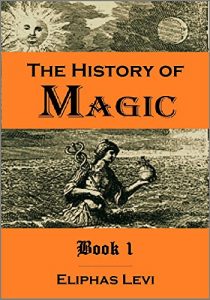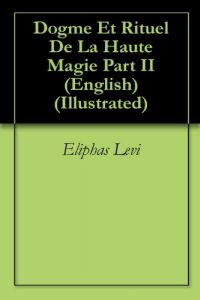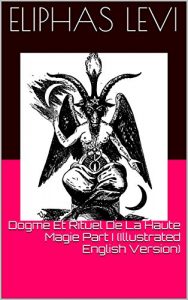Éliphas Lévi (1810 – 1875), was a French author and ceremonial magician.
In 1853, Lévi visited England, where he met the novelist Edward Bulwer-Lytton, who was interested in Rosicrucianism as a literary theme and was the president of a minor Rosicrucian order. Lévi's first treatise on magic appeared in 1854 under the title "Dogme de la Haute Magie," followed in 1856 by the companion "Ritual de la Haute Magie." The two books were later combined into one book titled Dogme et Rituel de la Haute Magie, which was translated into English by Arthur Edward Waite as Transcendental Magic, its Doctrine and Ritual in 1896. Lévi began to write in succession Histoire de la Magie in 1860.
Lévi's version of magic became a great success, especially after his death. That Spiritualism was popular on both sides of the Atlantic from the 1850s contributed to this success. His magical teachings were free from obvious fanaticisms, even if they remained rather murky; he had nothing to sell, and did not pretend to be the inititate of some ancient or fictitious secret society. It was largely through the those inspired by him that Lévi is remembered as one of the key founders of the 20th century revival of magic.
The translator Arthur Edward Waite (1857 – 1942), commonly known as A. E. Waite, was an American-born British poet and scholarly mystic who wrote extensively on magic and esoteric matters.
Contents of Book 1:
CHAPTER I
FABULOUS SOURCES
CHAPTER II
MAGIC OF THE MAGI
CHAPTER III
MAGIC IN INDIA
CHAPTER IV
HERMETIC MAGIC
CHAPTER V
MAGIC IN GREECE
CHAPTER VI
MATHEMATICAL MAGIC OF PYTHAGORAS
CHAPTER VII
THE HOLY KABALAH
Originally published in 1922; reformatted for the Kindle; may contain occasional imperfection; original spellings have been kept in place.
In 1853, Lévi visited England, where he met the novelist Edward Bulwer-Lytton, who was interested in Rosicrucianism as a literary theme and was the president of a minor Rosicrucian order. Lévi's first treatise on magic appeared in 1854 under the title "Dogme de la Haute Magie," followed in 1856 by the companion "Ritual de la Haute Magie." The two books were later combined into one book titled Dogme et Rituel de la Haute Magie, which was translated into English by Arthur Edward Waite as Transcendental Magic, its Doctrine and Ritual in 1896. Lévi began to write in succession Histoire de la Magie in 1860.
Lévi's version of magic became a great success, especially after his death. That Spiritualism was popular on both sides of the Atlantic from the 1850s contributed to this success. His magical teachings were free from obvious fanaticisms, even if they remained rather murky; he had nothing to sell, and did not pretend to be the inititate of some ancient or fictitious secret society. It was largely through the those inspired by him that Lévi is remembered as one of the key founders of the 20th century revival of magic.
The translator Arthur Edward Waite (1857 – 1942), commonly known as A. E. Waite, was an American-born British poet and scholarly mystic who wrote extensively on magic and esoteric matters.
Contents of Book 1:
CHAPTER I
FABULOUS SOURCES
CHAPTER II
MAGIC OF THE MAGI
CHAPTER III
MAGIC IN INDIA
CHAPTER IV
HERMETIC MAGIC
CHAPTER V
MAGIC IN GREECE
CHAPTER VI
MATHEMATICAL MAGIC OF PYTHAGORAS
CHAPTER VII
THE HOLY KABALAH
Originally published in 1922; reformatted for the Kindle; may contain occasional imperfection; original spellings have been kept in place.












